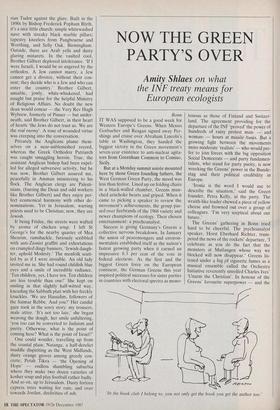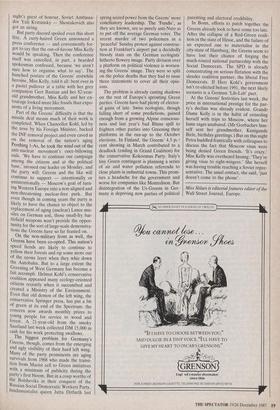NOW THE GREEN PARTY'S OVER
Amity Shlaes on what
the INF treaty means for European ecologists
Bonn IT WAS supposed to be a good week for Western Europe's Greens. When Messrs Gorbachev and Reagan signed away Per- shings and cruise over Abraham Lincoln's table in Washington, they handed the biggest victory in the Green movement's seven-year existence to anti-nuclear agita- tors from Greenham Common to Comiso, Sicily.
But at a Monday summit soirée mounted here by those Green founding fathers, the West German Green Party, the mood was less than festive. Lined up on folding chairs in a black-walled chamber, Greens mun- ched artichoke hearts and griped. When it came to picking a speaker to review the movement's achievements, the group pas- sed over firebrands of the 1968 variety and newer champions of ecology. Their chosen entertainment: a psychoanalyst.
Success is giving Germany's Greens a collective nervous breakdown. In January the union of peacemongers and environ- mentalists established itself as the nation's fastest growing party when it earned an impressive 8.3 per cent of the vote in federal elections. As the first and the biggest Green force on the European continent, the German Greens this year inspired political successes for sister parties in countries with electoral spectra as mono-
tonous as those of Finland and Switzer- land. The agreement providing for the departure of the INF 'proved' the power of hundreds of rainy protest man- — and woman- — hours at missile bases. But a growing fight between the movements more moderate `realists' — who would pre- fer to join forces with the big opposition Social Democrats — and party fundamen- talists, who stand for party purity, is now wrecking the Greens' power in the Bunde- stag and their political credibility in Europe.
`Ironic is the word I would use to describe the situation,' said the Green founder, Petra Kelly, at the party. The wraith-like leader chewed a piece of yellow cheese and frowned out over a group of colleagues. 'I'm very sceptical about our future.'
The Greens' gathering in Bonn tried hard to be cheerful. The psychoanalyst speaker, Horst Eberhard Richter, trum- peted the news of the rockets' departure, `I celebrate as you do the fact that the monsters at Mutlangen whose way we blocked will now disappear.' Greens lis- tened under a fug pf cigarette fumes as a musical ensemble called the Orchestra Initiative reverently unrolled Charles Ives' 'Unarm the Christian'. In honour of the Greens' favourite superpower — and the 'In the book club 1 belong to, you not only get the book you get the author too.' night's guest of honour, Soviet Ambassa- dor Yuli Kvitsinsky — Shostakovich also got an airing.
But party discord spoiled even this short fête. A curly-haired Green announced a press conference — and conveniently for- got to say that the out-of-favour Miss Kelly would be speaking. Then the conference itself was cancelled, in part, a bearded spokesman confessed, because 'we aren't sure how to organise what to say'. The hunched posture of the Greens' erstwhile heroine, Miss Kelly, told it all: bent over in a pastel pullover at a table with her grey companion Gert Bastian and her 82-year- old grandmother, Miss Kelly and her en- tourage looked more like fossils than expo- nents of a living movement. Part of the Greens' difficulty is that the missile deal means much of their work is completed. When Chancellor Kohl, led by the nose by his Foreign Minister, backed the INF removal project and even caved in on the removal of the nation's aging Pershing 1-As, he took the wind out of the anti-nuclear movement's once-billowing sails. 'We have to continue our campaign among the citizens and at the political base,' intoned one leader on Monday, and the party will: Greens and the like will continue to support — intentionally or unintentionally — Moscow's goal of turn- ing Western Europe into a non-aligned and non-threatening nuclear-free park. But even though in coming years the party is likely to have the chance to object to the replacement of aging (nuclear) Lance mis- siles on German soil, those small-fry bat- tlefield weapons won't provide the oppor- tunity for the sort of large-scale demonstra- tions the Greens have so far feasted on.
On the non-military front as well, the Greens have been co-opted. This nation's speed fiends are likely to continue to yellow their forests and rip some more out of the ozone layer when they whiz down the Autobahn. But to a large extent the Greening of West Germany has become a fait accompli. Helmut Kohl's conservative coalition appeased many ecology-oriented citizens recently when it succumbed and created a Ministry of the Environment. Even that old demon of the left wing, the conservative Springer press, has put a bit of green at its end of the Spectrum: the concern now awards monthly prizes to young people for service to wood and forest. A 21-year-old from the smoky Saarland last week collected DM 15,000 in cash for his work protecting swallows. The biggest problem for Germany's Greens, though, comes from the emerging and ugly visibility of their hard left wing. Many of the party prominents are aging survivals from 1968 who made the transi- tion from Maoist cell to Green initiatives with a minimum of publicity during the party's first bloom. But in a coup worthy of the Bolsheviks in their conquest of the Russian Social Democratic Workers Party, fundamentalist queen Jutta Ditfurth last spring seized power from the Greens' more conciliatory leadership. The `Fundis', as they are known, are so purely anti-Nato as to put off the average German voter. The recent murder of two policemen in a `peaceful' Sunday protest against construc- tion at Frankfurt's airport put a decidedly bloody stain on the German ecologists' hitherto flowery image. Party division over a platform on political violence is worsen- ing the Greens' image. They were so split on the police deaths that they had to issue three statements to cover all their opin- ions.
The problem is already casting shadows on the rest of Europe's sprouting Green parties. Greens have had plenty of elector- al gains of late. Swiss ecologists, though falling short of some predictions, gained enough from a growing Alpine conscious- ness and last year's bad Rhine spill to frighten other parties into Greening their platforms in the run-up to the October elections. In Finland, the Greens' 4.5 pt. r cent showing in March contributed to a deadlock (ending in Grand Coalition) for the conservative Kokoomus Party. Italy's tiny Green contingent is planning a series of air and water pollution referenda to close plants in industrial towns. This prom- ises a headache for the government and worse for companies like Montedison. But disintegration of the Ur-Greens in Ger- many is depriving new parties of political parenting and electoral credibility.
In Bonn, efforts to patch together the Greens already look to have come too late. After the collapse of a Red-Green coali- tion in the state of Hesse, and the failure of an expected one to materialise in the city-state of Hamburg, the Greens seem to have lost their chance of forging the much-touted national partnership with the Social Democrats. The SPD is already concentrating on serious flirtation with the slender coalition partner, the liberal Free Democrats. If Herr Kohl's government isn't re-elected before 1991, the next likely scenario is a German `Lib-Lab' pact.
At the Greens' festivities last week, the price in international prestige for the par- ty's decline was already evident. Grande Dame Kelly is in the habit of consoling herself with trips to Moscow, where her fame rages unabated. (Mr Gorbachev him- self sent her grandmother, Kunigunde Birle, birthday greetings.) But on this night Petra huddled frantically with colleagues to discuss the fact that Moscow visas were being denied Green friends. 'It's crazy,' Miss Kelly was overheard hissing: 'They're giving visas to right-wingers.' She herself was having trouble reaching a Soviet repre- sentative. The usual contact, she said, 'just doesn't come to the phone'.
Miss Shlaes is editorial features editor of the Wall Street Journal, Europe.











































































































 Previous page
Previous page